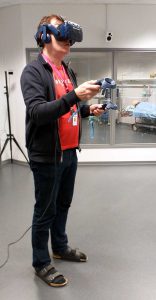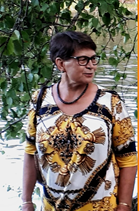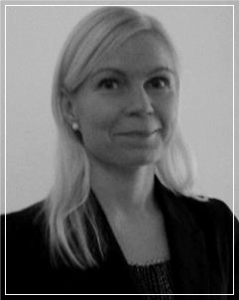What have we done so far in Future Technologies in Education –project?
A year has gone in understanding and finding out the best technological solution to use that brings added valued to the entire education process of health care professionals.
There is a huge potential for XR applications in healthcare education. During the first year of the project, we found out the best options to the training environment of the clinical laboratory, operating room, and instrument care. At the international level, we have also supported the digitalization strategy of our Bulgarian partner by sharing knowledge and starting the benchmarking of technological solutions used in education at the level of vocational and higher education. The selected technological solutions will be piloted and tested during this spring 2020. These technological solutions will be compared with the current educational solutions and teaching methods. Based on the results from the pilot, the solutions used in education will be further developed and later take as a part of education process and training.
Biomedical laboratory training
In this project, we collaborate with South Karelia Social and Health Care District (Eksote) hospital laboratory in Lappeenranta. Eksote clinical laboratory will be a part of Helsinki University Hospital (HUS) laboratory in 2020. Eksote laboratory has been collaborator since 2014, when the first satellite education group of Biomedical Laboratory Science was started in collaboration with Savonia-UAS and Eksote.
An important component in the Biomedical Laboratory Science education is to know the laboratory´s working environment including processes, activities and equipment. In addition, the knowledge of the laboratory safety aspects are essential when working in clinical hospital laboratory. For these reasons, a clinical laboratory environment was scanned by Matterport-camera to get 3D models of real hospital laboratory. This 3D- virtual tour was created to enable students and staff to familiarize in advance and in their own work pace the safety issues e.g. in the laboratories of clinical hematology, clinical chemistry, clinical microbiology and clinical pathology.
In addition, we have planned how VR glasses and interactive videos can be used efficiently in the learning and familiarization process of laboratory equipment e.g. such as the laboratory microscope and Point-of-care (POC)-equipment.
We have also realized the importance to develop virtual material to study the histology process in clinical laboratory. Therefore, we are going to pilot and evaluate the usefulness of VR glasses to study this process.
In addition, we plan to use AR and smart glasses to provide a live connection between the clinical laboratory and the university classroom. These authentic live connections will enable our students to understand real laboratory work, equipment and processes. Furthermore, this technology could be used for consultation between staff and technical experts e.g. in case of equipment maintenance or service.
In addition, the students of biomedical laboratory science have been part of this development work by helping us to create the content of environments. The students of engineer have been creating VR simulations. In this way, these environments will better serve not only staff but also our students.
Operating rooms and instrument maintenance training
The VR and AR applications in nursing care, especially in perioperative care, are quite many. At the moment, they are mainly designed for surgeons, with only some applications from a nurse’s perspective. During the last autumn, we decided the areas to be developed and technologies to use in the education and training of perioperative nursing. At present, we go further on with the purchase and tendering process of the technologies used in the project.
We are collaborating with our regional partners; the Kuopio University Hospital, KUH, operating theaters and Servica, the instrument maintenance company.
The Finnish project team visited Servica’s Central Sterile Services Department in Kuopio University Hospital in September 2019. During the interesting and rewarding visit, they showed us the entire surgical instruments maintenance process from the instrument´s cleaning and disinfection to the delivering to clients. At the same time, we discussed about making the 3D – photo shootings with Matterport in the Central Sterile Services Department. In addition we have decided to pilot how to created 3D models of instruments. These 3D models will help e.g. daily work of instrument maintainer.
Together with KUH and operation theater we discussed the detailed co-operation and work plan for perioperative nursing. We have done 3D-photo shootings with Matterport in the operating theater. These 3D- virtual tours enable students and staff to familiarize in advance in their own work pace. In addition, different kind of VR simulations were planned especially from the perspective of nurse anesthetists.
We have wanted to take, not only staff, but also the students into this development work e.g. they will take part in creating the content of both the operating rooms and instrument maintenance. It is important to develop common learning environments that really serve both students and staff.
International collaboration with Bulgarian
The sharing of knowledge, benchmarking and planning of virtual learning environment have been the major activities covering the first year. Joint international meetings, together with Yatrus Foundation and other partners, have been important in the start-up phase and supported the start of project cooperation. We can together note that the use of XR solutions in Finland is slightly more widespread and thus the need for the training content to harmonize virtual technology activities in the Europe level is essential. Therefore, we also developed a XR training module for professionals to upgrade practical skills in new technologies. This intensive course will be in Kuopio during spring 2020.
During last visit in Bulgaria. We had a great possibility to visit different authorities and meet experts in education in Sofia e.g. we visited in the Business Initiative Union (SSI), the University of National and World Economy (UNWE Sofia), the National Agency for Vocational Education (NAVET) and Ministry of Education and Science (MON). We are an important and interesting partner for Bulgarian authorities. Digitalization of education is essential and big challenge for both of us.
We have strengthened the collaboration with the University of Ruse, Faculty of Public Health and Health Care, to develop a 5 ECTS virtual module for internationalization at home. In this module, Finnish and Bulgarian students can study basic knowledge from both countries and get more information about student exchange. In addition, they can study perioperative nursing, instrument maintenance and biomedical laboratory science in those virtual environments created in this project. This virtual module will be during spring 2020. At the same time, we are negotiating the content of teacher and student exchange agreements. Later these will be sign between partners, which enables student and professionals exchange between countries. First exchanges were planned for autumn 2020.
Conclusions
The last year has been very intensive with meetings, tests and visits to our partners Eksote in Lappeenranta and Ruse in Bulgaria. We are proud of the lessons learnt and the achievements done. We are looking with enthusiasm the year 2020!
More details of the international visits at:
Visit to Ruse, April, 2019: https://sway.office.com/s/aSeOzwyRmt7da1YO/embed
Visit to Kuopio, August 2019: https://sway.office.com/s/E4VwOO5l7xxQKk3z/embed
Visit to Ruse, November, 2019: https://sway.office.com/s/dQ5yZ6rnF8JAL6wY/embed
Editorial group of the blog:
Petteri Alanko
Communications Manager
Savonia UAS
Petteri.alanko@savonia.fi
Marja Silen-Lipponen
Principal Lecturer
Savonia UAS
Marja.Silen-Lipponen@savonia.fi



